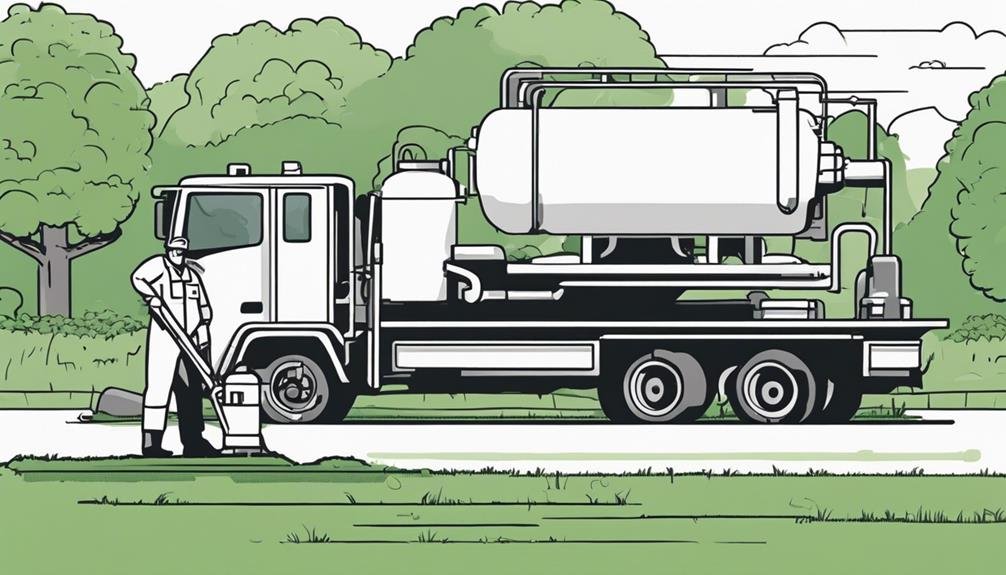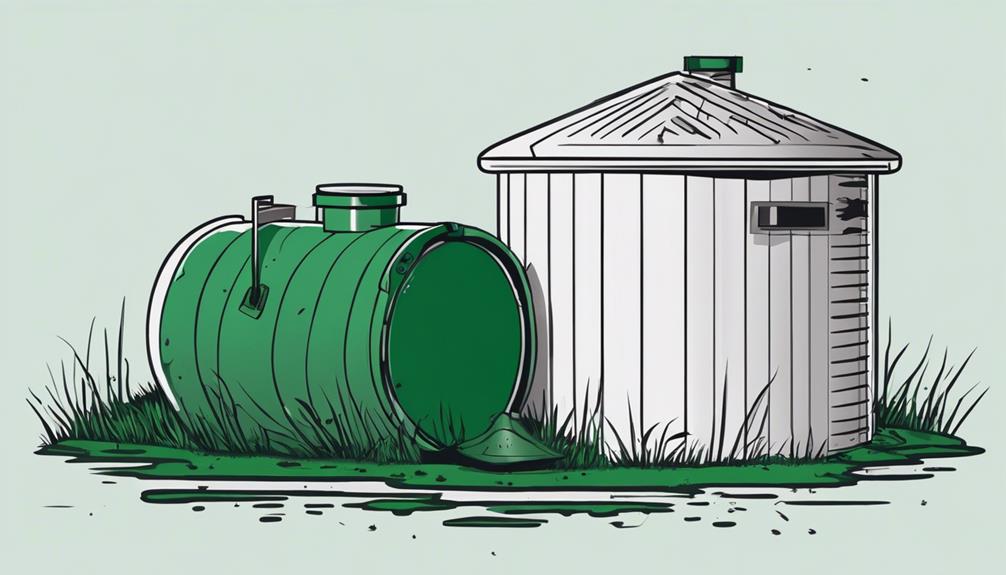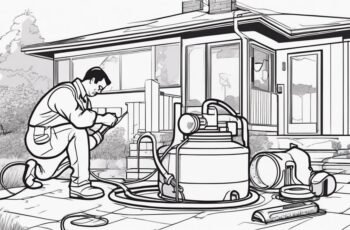You've likely invested time and money into the upkeep of your home, making sure every aspect is functioning smoothly.
But have you considered the hidden hero beneath your property that needs attention too? Ensuring your septic tank is in top condition is crucial for maintaining a healthy and efficient household.
By understanding the key factors that influence the performance of your septic system, you can avoid costly repairs and keep your home running smoothly.
But what exactly should you be looking out for?
Key Takeaways
- Regular pumping every 3-5 years maintains septic efficiency.
- Prevent costly repairs by avoiding system neglect.
- Safeguard drain field and prevent backups with timely pump-outs.
- Environmental protection and groundwater safety through proper maintenance.
Importance of Regular Pumping

Regular pumping of your septic tank is crucial for maintaining its efficiency and preventing costly repairs. Over time, solid waste and sludge accumulate in your tank, reducing its capacity and hindering proper wastewater treatment. By scheduling regular septic tank maintenance, you ensure that these solids are removed, allowing your system to function optimally. Pumping benefits extend beyond just preventing backups and malfunctions; it also safeguards your drain field from becoming clogged and prolongs the lifespan of your entire septic system.
Failing to pump your septic tank on a routine basis can lead to a host of issues, such as sewage backups, foul odors, and even system failure. Neglecting this essential maintenance task can result in expensive repairs or the need for a complete system replacement. By prioritizing regular pumping, you not only save money in the long run but also avoid the inconvenience and disruption that come with septic system failures. Remember, investing in proper septic tank maintenance is investing in the longevity and efficiency of your home's wastewater treatment system.
Factors Influencing Pumping Frequency
To determine the ideal pumping frequency for your septic tank, consider various factors such as household size, water usage, and the presence of garbage disposals. These elements play a crucial role in maintaining the efficiency of your septic system and preventing issues like groundwater contamination and soil compaction. Here are some key points to help you gauge the pumping frequency that suits your specific needs:
- Household Size: The number of individuals in your household directly impacts the amount of wastewater generated, affecting how quickly your septic tank fills up.
- Water Usage: High water usage, whether due to frequent laundry loads or long showers, can overload your septic system, necessitating more frequent pump-outs.
- Garbage Disposals: Garbage disposals increase solid waste in the tank, requiring more frequent pumping to prevent clogs and backups.
- Soil Composition: Different soil types absorb water at varying rates, influencing how quickly your tank reaches capacity.
- Maintenance History: Regular maintenance and inspections can help determine if it's time for a pump-out based on the accumulation of sludge and scum layers.
Signs Your Tank Needs Pumping

If you notice foul odors lingering around your property, it may be a sign that your septic tank needs pumping. Foul smells suggest that the waste inside the tank isn't properly decomposing or that there's a blockage in the system.
Another warning sign is if you observe slow draining sinks, toilets, or showers. This could indicate that the solids in the tank have built up over time, reducing the tank's capacity to hold wastewater.
Additionally, if you see lush, green patches of grass over the drain field, it might mean that the tank is overflowing, causing excess liquid to surface and fertilize the area. Gurgling sounds coming from the drains may signal that the tank is full and needs immediate attention.
To avoid these issues, regular preventive maintenance is crucial. By being attentive to these warning signs and scheduling timely pump-outs, you can ensure that your septic tank operates efficiently and prolong its lifespan.
Recommended Pumping Schedule
Noticing the signs that your septic tank needs pumping is crucial for maintaining its efficiency and longevity; establishing a recommended pumping schedule is the next step in ensuring optimal system performance.
- Regular Pumping Schedule: Aim to pump your septic tank every 3-5 years to prevent solids from building up and causing blockages.
- Adjust Based on Usage: For larger households or increased water usage, consider more frequent pumping every 2-3 years.
- Environmental Impact: Regular pumping reduces the risk of groundwater contamination and helps protect the environment.
- DIY Options: While pumping is typically done by professionals, some homeowners with the right equipment and knowledge can attempt it themselves.
- Cost Considerations: Factor in the cost of pumping as part of your septic tank maintenance budget; preventive pumping can save you from costly repairs in the long run.
Frequently Asked Questions
How Can I Prevent Tree Roots From Invading My Septic Tank and Causing Damage?
To prevent tree roots from damaging your septic tank, install a root barrier and take preventive measures like regular inspections. Consider landscaping around the tank to control root growth effectively. Keep an eye out for any signs of intrusion.
Are There Any Specific Household Cleaners or Chemicals That Should Be Avoided to Maintain a Healthy Septic Tank?
When it comes to maintaining a healthy septic tank, it's crucial to steer clear of harmful cleaners and chemicals. Avoid using bleach, antibacterial soaps, and strong solvents as they can disrupt the balance of your tank's ecosystem.
What Steps Can I Take to Reduce Water Usage in My Household and Extend the Time Between Septic Tank Pumpings?
To reduce water usage and extend time between septic pumpings, try fixing leaks promptly, installing low-flow fixtures, using efficient appliances, and spreading out laundry loads. These water conservation techniques can help prolong septic longevity.
Is It Necessary to Have My Septic Tank Inspected Regularly by a Professional, Even if There Are No Noticeable Issues?
Regular professional septic tank inspections are essential for preventive maintenance. Even without apparent issues, inspections can catch early signs of problems, potentially saving you money in the long run. Consider cost-effective alternatives like DIY inspection techniques.
Are There Any DIY Maintenance Tasks I Can Perform on My Septic Tank Between Professional Pumpings to Keep It in Top Condition?
To keep your septic tank in top condition between professional pumpings, you can manage septic tank bacteria effectively with DIY septic tank additives. These additives help maintain a healthy balance, ensuring smooth operations and longevity.
Conclusion
So, remember to schedule regular pumping for your septic tank to avoid costly repairs and unpleasant odors.
By keeping up with maintenance, you can prevent backups and ensure your system functions smoothly.
Don't wait until it's too late – take care of your septic tank now to save yourself from headaches later on.
Trust me, a little maintenance now will save you a lot of hassle in the future.

